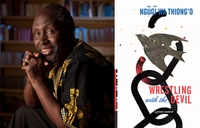In these essays based on his 2006 McMillan-Stewart Lectures at Harvard, Kenyan novelist Ngugi (The Wizard of the Crow
), asks, “Is an African renaissance possible when we keepers of memory have to work outside our own linguistic memory?” a theme he has explored privately and publicly since his decision in the 1970s to write in his native tongue, Kikuyu. In the first lecture, “Dismembering Practices,” Ngugi reaches into the English-Irish past (“a prototype for all other colonies in Asia, Africa and America”) with a surprising turn to “The Fairie Queen, the poetic manual of English nationalism.” In “Re-membering Visions,” he compares the “different attitudes toward African memory and means of memory [of] the diasporic and educated continental Africans,” with particular attention to Garveyism and Pan-Africanism. With “Memory, Restoration, and African Renaissance,” Ngugi moves fully into his argument for the crucial role of African languages in “the resurrection of African memory,” echoing European writers’ “victorious emergence from the shadow of Latin.” Ngugi’s language is fresh; the questions he raises are profound, the argument he makes is clear: “To starve or kill a language is to starve and kill a people’s memory bank.” (Mar.)


